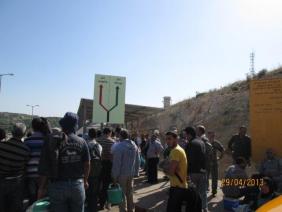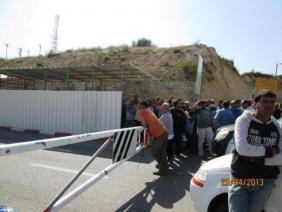'Anin, Barta'a-Reihan, Tura-Shaked, Mon 29.4.13, Afternoon
North, 29.4.13, afternoon
Leah R., Anna N.S.
Translator: Charles K.
15:15 A’anin agricultural gate (on the separation fence, for farmers cut off from their land by the fence)
The checkpoint opens at 15:00. Those waiting said that about 25 people had crossed by the time we arrived, all residents of A’anin returning home after working outside the village. A few tractors loaded with scrap also waited. Everyone was tired. It’s hot, and particularly hot at this hour.
The soldiers inspect every item in the bags people carry. The young men cross last; it’s not clear why. Gradually, everyone but M. goes through. His tractor is loaded with used mattresses, old blankets and some broken plastic chairs. The soldiers aren’t letting him bring the load across. M. asks, pleads, explains how much he needs the goods, tells them how poor he is, how many troubles: “I have seven children and no money,” he says and displays his ID card. It doesn’t help. The soldiers stick to the rules. Correction: there are rules, regulations, laws passed by the Knesset, but there’s also common sense and judgment. But the soldiers insist: only agricultural produce is allowed through an agricultural checkpoint. M. points to his ten year old son sitting next to him on the tractor, describes a school trip to Ramallah which he couldn’t join because M. couldn’t pay the fee. The soldiers don’t care. He removes the blue independence day cap his son is wearing and shows it to the soldiers. “Do you know what this is, huh?” he asks. “I love peace, I love Jews…” M. continues to beg; his humiliation and this ridiculous argument over a pile of junk are heartrending. What must M. think of us? What’s going through his head?
I want to photograph the tractor and controversial pile of junk but M. refuses, and I back down. When the soldiers move to close the checkpoint he unloads the broken plastic chairs next to the fence and goes through. He’s followed at the last minute by three more Palestinians after they were interrogated.
I’ll forgo quoting the crude pearls of racism and ignorance we heard from the soldiers who aren’t aware of the fact that it’s occupied territory. Here’s what one soldier said, more or less: We’re strong. We have weapons, so it’s ours.
A Palestinian sanitation worker collected the garbage around the checkpoint.
16:00 Tura-Shaked checkpoint (a “fabric of life” checkpoint between Palestinian villages in Area C)
Only a few people and one vehicle crossed to the West Bank during the quarter-hour we were there. Only two people crossed to the seam zone.
16:20 Barta’a-Reihan checkpoint (the largest checkpoint in the area, with a large terminal; it’s been privatized)
More than 200 people crowd next to the fenced corridor to the upper terminal entrance. The checkpoint is closed! It’s training time! The DCO didn’t know when the checkpoint would open. People say they’ve been waiting about an hour. Soldiers in a military vehicle who were also waiting said the exercise will be over within 15 minutes. People are tired after a day of work, they crowd at the checkpoint, it’s hot, unpleasant, they’re even too tired to complain.
The checkpoint opens ten minutes later and the mass of people returning flowed through the fenced corridor to the terminal and out to the Palestinian parking lot. The waiting vehicles also crossed. The taxi drivers in the Palestinian parking lot waited together; one prayed. People described their hardships to us; they have many, in particular the fact that no one helps them, not the Palestinian authority, not the occupiers, nor us either.
17:00 We left.
